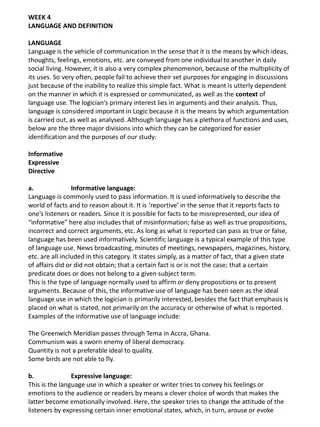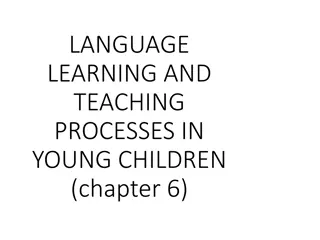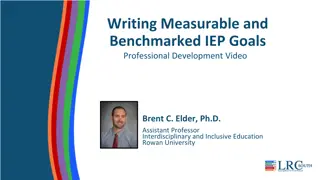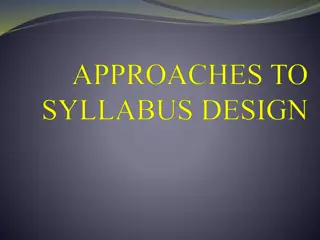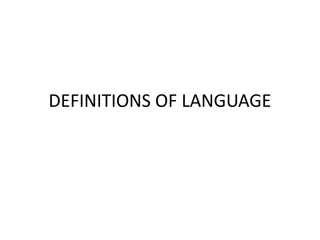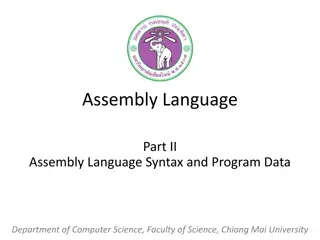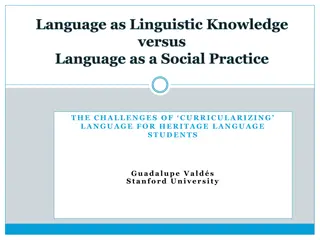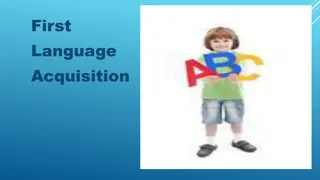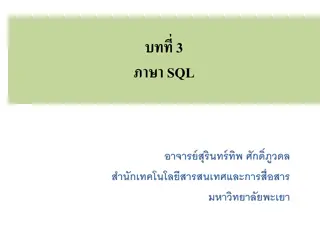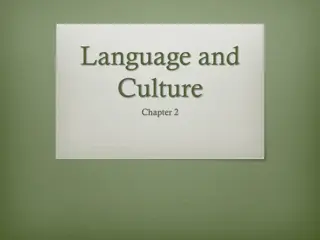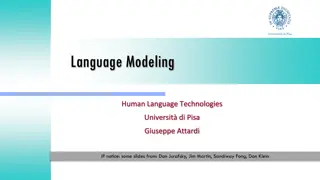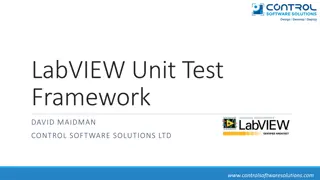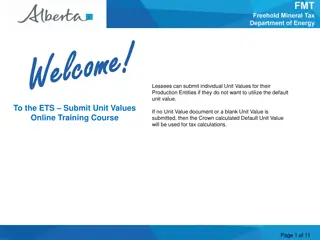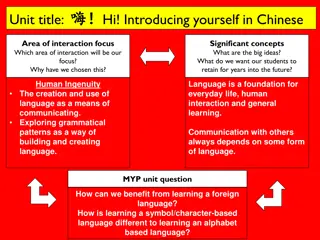Career Opportunities and Challenges in Translation & Interpreting Pedagogy Post-Pandemic
The APTIS 2022 conference explores new avenues in Translation and Interpreting (T&I) pedagogy amidst a changing landscape. Dr. Bego A. Rodriguez highlights emerging roles for T&I graduates. The context reveals a decline in language learning in the UK, impacting the Language Service Industry. The UK'
0 views • 13 slides
Language Study Community – Enhance Your Language Skills
Joining a Language Study Group is a fantastic way to take your language learning to the next level. By leveraging the power of Group Study, you can immerse yourself in the language, enhance your understanding, and build confidence in your speaking abilities. Read full article \/\/explainlearning.com
1 views • 3 slides
Language Expectations and Functions in Educational Units
Explore the importance of unit language goals in educational settings, focusing on identifying language expectations, functions, and features. Understand how to describe language use for content learning and support multilingual learners. Examples from science and ELA units illustrate practical appl
8 views • 11 slides
Academic Language Demands and Supports in Instructional Planning
Academic Language Demands and Supports are crucial in educational settings to ensure comprehension and usage of language by students. This content discusses embedding language demands in lesson plans, providing language supports, and peer review activities to enhance academic language skills. The fo
6 views • 10 slides
The Significance of Media in Language Learning
Media plays a crucial role in language learning by raising awareness of the ideology behind linguistic structures and providing valuable information on society and culture. Linguists are drawn to media language for research purposes and to understand its impact on language use and attitudes. Media s
12 views • 5 slides
Understanding Translation: Key Concepts and Definitions
Translation involves transferring written text from one language to another, while interpreting deals with oral communication. Etymologically, the term "translation" comes from Latin meaning "to carry over." It is a process of replacing an original text with another in a different language. Translat
11 views • 76 slides
Language and Communication in Society: Understanding Interactions
Explore the intricate relationship between language and society through lectures focusing on language in interaction, power dynamics, language contact and change, public space discourse, linguistic landscaping, and more. Delve into the shift from structural linguistics to societal communication, red
6 views • 28 slides
Understanding Language: Informative, Expressive, and Directive Uses
Language serves as a vital medium for communication, allowing the conveyance of ideas, thoughts, and emotions. It is a complex phenomenon with diverse uses. This text delves into the three major divisions of language use - informative, expressive, and directive. Informative language conveys facts, w
4 views • 6 slides
Language Learning and Teaching Processes in Young Children
Development of language in young children is influenced by various factors such as their cultural and linguistic environment, unique characteristics, and interactions with adults. Optimal language development requires language stimulation from the environment. Varied cultural practices impact langua
1 views • 51 slides
Understanding Language in Stoicism: Significance and Corporeality
Language in Stoicism plays a crucial role in the process of assenting to impressions by focusing on corporeality, reason, and truth. It distinguishes between the mundane vocal sounds, articulated speech, and significant language to convey meanings effectively. The significance of language lies not i
2 views • 13 slides
Effective Strategies for Writing and Benchmarking IEP Goals
Enhance your understanding of writing measurable IEP goals and implementing effective benchmarking techniques through this insightful professional development video by Dr. Brent C. Elder, an assistant professor at Rowan University. Learn about the importance of annual goals and benchmarks, the benef
2 views • 15 slides
Understanding Language Teaching Syllabus: Integration, Theory, and Approaches
Language Teaching Syllabus involves the integration of subject matter and linguistic elements, guided by theories of language and learning. Various approaches like Grammatical, Situational, Communicative, and Analytic are used to structure syllabi. Breaking language into parts aids in sequential lea
1 views • 28 slides
Exploring Language and Communication Through a Short Film
In this lesson, students will watch a 10-minute short film titled "The Most Beautiful Thing" by Cameron Covell. They will reflect on the value of learning another language, analyze how facial expressions and body language convey emotions, and develop empathy towards those facing language barriers or
0 views • 29 slides
Various Definitions of Language Throughout Linguistic History
Different linguists and scholars have offered various definitions of language over time. Sapir (1921) emphasized language as a method of communicating ideas, emotions, and desires through voluntary symbols. Bloch and Trager (1942) focused on the social aspect of language as a system of vocal symbols
1 views • 12 slides
Introduction to Assembly Language Syntax and Program Data
Learn about the syntax of assembly language and how data, variables, and constants are used in programming. Explore the basic instructions and the translation of high-level language into assembly language. Discover the role of an assembler in translating assembly language programs into machine langu
4 views • 36 slides
Enhancing Language Learning Across the Curriculum in B.Ed. 1st Year Course
Language Across the Curriculum (LAC) emphasizes that language learning should occur across all subjects, not just in language classrooms. It highlights the importance of incorporating language development into every learning activity, fostering multilingualism in schools. Language plays a crucial ro
2 views • 34 slides
Mastering the Art of Goal Setting for Sustainable Success
Effectively developing good goals is essential for maintaining a consistent pace towards success. By ensuring goals are SMART (Specific, Measurable, Accountable, Realistic, Timetabled), individuals can enhance their focus, motivation, and progress tracking. Specific goals help in clarifying objectiv
2 views • 10 slides
Challenges of Curricularizing Language for Heritage Language Students
The field of Heritage Language Education has shown growth and importance in recent years, with a focus on teaching minority languages for various purposes. Researchers are studying heritage languages spoken around the world. Despite progress, there is a tension between common goals in HL education a
0 views • 47 slides
Understanding First Language Acquisition Process
First language acquisition is the process through which humans develop the capacity to perceive, comprehend, and effectively use language to communicate. It primarily focuses on infants acquiring their native language. Basic requirements, caregiver speech features, and the acquisition schedule play
0 views • 19 slides
Art Creative Practice Unit 4 Overview: Study Specifications and Assessment
This presentation delves into the features of Art Creative Practice Unit 4, outlining the study specifications focusing on research, experimentation, reflection, and evaluation. It explores interpretive lenses such as the Structural, Personal, and Cultural lenses, guiding the analysis and interpreta
0 views • 37 slides
Comprehensive Overview of SQL Commands and Language Categories
In this detailed guide, you will learn about Structured Query Language (SQL) including its various commands such as Data Definition Language (DDL), Data Manipulation Language (DML), Data Control Language (DCL), and Transaction Control Language (TCL). Explore how SQL is used in Database Management Sy
0 views • 15 slides
Speech and Language Developmental Milestones: A Bilingual/Multilingual Perspective
Speech and language developmental milestones are crucial for children, regardless of their home language. These milestones encompass receptive language, expressive language, pragmatics, and articulation and phonology. Understanding how a child hears and talks from birth to one year is essential, as
1 views • 23 slides
Understanding .NET Framework Architecture and Common Language Runtime
This content delves into the intricacies of .NET architecture, highlighting its structure, common language runtime, and key components such as Common Type System (CTS) and Common Language System (CLS). It explains how .NET supports multiple languages, facilitates cross-language interoperability, and
0 views • 13 slides
Overview of U.S. Army Force Structure and Unit History Division
This content delves into the lineage, honors, and organizational history of the U.S. Army Force Structure and Unit History Division, highlighting its role in maintaining official unit designations, selecting historic units for reactivation, and supporting force structure planning. It outlines the fu
1 views • 11 slides
Analyzing Writer's Language Use in English Language GCSE Component 2
In English Language GCSE Component 2, students learn to analyze how writers use language. The learning objective focuses on commenting, explaining, and analyzing language use with relevant subject terminology. The exam assesses students on their ability to interpret and explain a writer's thoughts,
0 views • 12 slides
Language and Culture Reflections: Diversity in Linguistic Emphasis
Exploring the correlation between language and culture, this content delves into how various languages reflect cultural values and priorities. Through examples like the Inuit language with rich vocabulary for snow and seals, the Shinzwani culture's unique word for mother and aunt, and the evolving l
0 views • 50 slides
Engaging 5th Graders with 'Tuck Everlasting' Novel Unit
This educational unit revolves around the novel "Tuck Everlasting," designed for 5th graders to explore themes, characters, and plot elements while integrating language arts and science. The unit emphasizes emotional connections through creative activities like journal entries and tableau, as well a
0 views • 18 slides
Understanding Language Modeling in Human Language Technologies
Exploring the concepts of language modeling in human language technologies, this presentation delves into N-grams, the chain rule of probability, evaluation metrics like perplexity, smoothing techniques such as Laplace, and the goal of assigning probabilities to sentences. It covers applications lik
1 views • 81 slides
Understanding Unit Rates in Mathematics
Explore the concept of unit rates in mathematics, where you will learn how to determine unit rates of given quantities and solve word problems involving unit rates. Discover key vocabulary, such as ratio, rate, and terms, and understand the difference between ratio and rates. Delve into examples and
0 views • 22 slides
Introduction to Language Technologies at Jožef Stefan International Postgraduate School
This module on Knowledge Technologies at Jožef Stefan International Postgraduate School explores various aspects of Language Technologies, including Computational Linguistics, Natural Language Processing, and Human Language Technologies. The course covers computer processing of natural language, ap
0 views • 27 slides
Understanding the LabVIEW Unit Test Framework
Dive into the LabVIEW Unit Test Framework to grasp the benefits of unit testing, its importance in isolating code, finding defects early, improving code quality, and more. Explore creating unit tests, adding test cases, and leveraging this framework for efficient software validation. Ensure your sof
0 views • 19 slides
Exploring Sociolinguistics: Language Variation and Social Factors
Sociolinguistics delves into the study of language variation influenced by social factors, examining the relationship between language and its social context. It explores various aspects like standard pronunciation, language choice, speech acts, language components, language variety, and factors suc
0 views • 73 slides
Unit Name Details and Specifications
Explore the details and specifications of various units including deployment distance, size, weapon details, actions, and characteristics for Unit Name 1, Unit Name 2, Unit Name 3, and Unit Name 4. Each unit has its own unique attributes and is depicted with an image for reference.
0 views • 8 slides
Understanding Assembly Language Programming for Computing Layers
Assembly language is a low-level programming language that enables direct interaction with a computer's hardware components. This content explores the fundamentals of assembly language, the relationship between human-readable machine language and binary code, an assembly language program for multipl
0 views • 31 slides
Understanding Language Anxiety in Foreign Language Learning and Teaching
Explore the impact of language anxiety on students and teachers in foreign language learning and teaching contexts through insights from Dr. Christina Gkonou's research. Delve into the theoretical background, implications for language education, and real-life experiences shared at the Essex Language
0 views • 25 slides
Understanding Natural Language Generation (NLG) Process
Natural Language Generation (NLG) is the process of constructing natural language outputs from non-linguistic inputs. It involves generating text from machine representations to meet specific communicative goals. NLG is distinct from Natural Language Understanding (NLU) as it maps meaning to text, w
0 views • 38 slides
Unit Value Submission Guidelines for Production Entities
Learn how to submit individual unit values for production entities, understand the process of submitting unit values online or via CSV file, and follow the business rules set for unit value submissions. Ensure accurate submission to avoid default unit value calculations by the Crown.
0 views • 11 slides
Exploring Language and Cultural Exchange Through Chinese Greetings
This unit focuses on the benefits of learning a foreign language, particularly a character-based language like Chinese. Students delve into grammatical patterns, communication skills, and cultural exchanges through practicing greetings, writing conversations, and role-playing activities. The unit ai
0 views • 6 slides
Understanding Unit Testing in Software Engineering
Concept Software is a discipline comprising various code pieces. Testing these codes together is complex but vital in Software Engineering. The process includes early testing like unit tests, pairwise/multiple component testing, module testing, integration testing, user tests, alpha tests, beta test
1 views • 6 slides
A Guide to Being a Unit Engineer in an Ethylbenzene Unit
Dive into the world of unit engineering in an Ethylbenzene Unit with tasks like making rate changes, problem-solving, coordinating projects, communicating with various stakeholders, and more. Learn about the equipment, raw materials, and processes involved, and understand the impact of your unit's o
0 views • 24 slides







